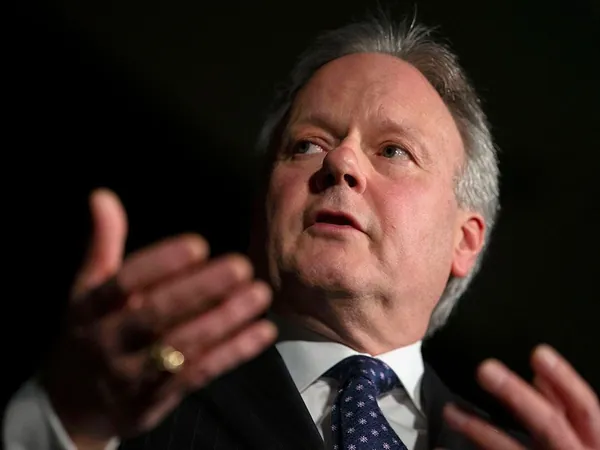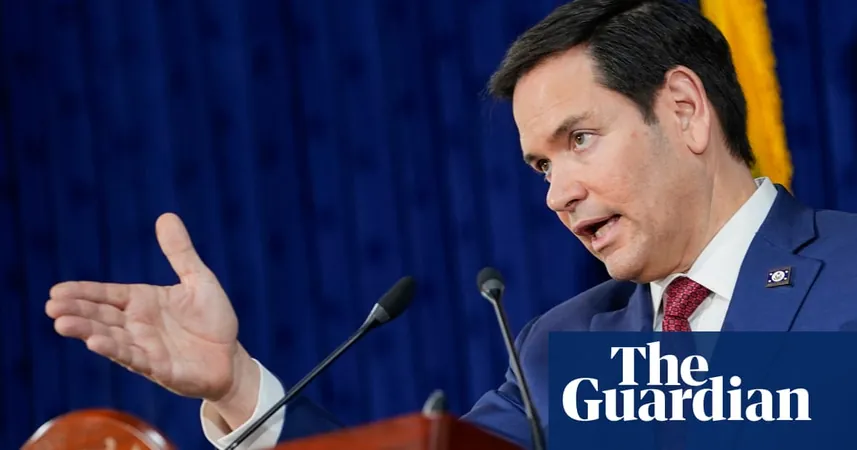
Former Bank of Canada Governor Warns: Canada Outmatched in Trade War with the U.S.
2025-03-26
Author: Jacques
Former Bank of Canada Governor Warns: Canada Outmatched in Trade War with the U.S.
In a recent webinar, former Bank of Canada governor Stephen Poloz issued a stark warning about the ongoing trade tensions between Canada and the United States, stating that Canada is "seriously outgunned" in this escalating conflict. Poloz, who is now a special adviser at Osler, Hoskin & Harcourt LLP, emphasized the importance of maintaining a strong partnership with the U.S. as a pillar for Canada’s economic future.
"When the dust settles, we will need our U.S. partnership, just as much as we need it today," Poloz remarked. He stressed the necessity of looking beyond the immediate challenges and focusing on long-term solutions, urging Canadians to make the best of the current unfavorable circumstances. "This is not just a fleeting disagreement. We must avoid viewing this as a Hatfields and McCoys situation; rather, we should think strategically," he said.
The implications of a prolonged trade war loom large, with the Bank of Canada projecting a possible three percent decline in the nation’s GDP over the next two years if tensions persist. Economists from Desjardins Group have echoed these concerns, predicting an economic contraction could commence as soon as the second quarter of this year.
Despite these grim forecasts, Poloz maintains an optimistic perspective. He believes that trade is fundamentally a human activity, conducted between people who generally respect and wish to collaborate with one another. “People forget that trade doesn’t happen between countries; it happens between people,” he emphasized, offering hope for a future resolution.
As political tensions ramp up in Canada, the trade war is expected to play a pivotal role in the upcoming federal elections. With leaders from both the Conservative and Liberal parties promising tax cuts for low-income earners, the economic debate is likely to intensify.
In response to the challenges posed by the trade war, Poloz advocates for a proactive fiscal strategy, emphasizing the need for investment rather than merely bolstering household spending. "I hope our response this time can focus more on promoting investment, rather than just stimulating consumption, which we relied on too heavily in the past," he suggested.
A significant development was also announced last week: Canadian federal and provincial governments plan to eliminate internal trade barriers, targeting free trade within the nation by July 1. Poloz believes this initiative will yield substantial benefits for the Canadian economy.
Looking ahead, Poloz laid out several strategies aimed at enhancing Canada’s competitive edge in the global market. His suggestions include designating energy and resource projects as within the national interest, embracing technological innovation, reforming the tax system to better support the manufacturing sector, and utilizing revenue from retaliatory tariffs to fund future tax cuts.
"We are on the brink of a major technological revolution," he stated. "The nature of global trade is shifting; more of it will focus on services rather than traditional goods. Our goal should be to position ourselves advantageously to leverage these changes."
Poloz’s insightful commentary serves as a critical reminder of the challenges and opportunities that lie ahead for Canada in the face of a tumultuous trade landscape. The question remains: will Canada rise to the occasion and emerge stronger from this turmoil?









 Brasil (PT)
Brasil (PT)
 Canada (EN)
Canada (EN)
 Chile (ES)
Chile (ES)
 Česko (CS)
Česko (CS)
 대한민국 (KO)
대한민국 (KO)
 España (ES)
España (ES)
 France (FR)
France (FR)
 Hong Kong (EN)
Hong Kong (EN)
 Italia (IT)
Italia (IT)
 日本 (JA)
日本 (JA)
 Magyarország (HU)
Magyarország (HU)
 Norge (NO)
Norge (NO)
 Polska (PL)
Polska (PL)
 Schweiz (DE)
Schweiz (DE)
 Singapore (EN)
Singapore (EN)
 Sverige (SV)
Sverige (SV)
 Suomi (FI)
Suomi (FI)
 Türkiye (TR)
Türkiye (TR)
 الإمارات العربية المتحدة (AR)
الإمارات العربية المتحدة (AR)